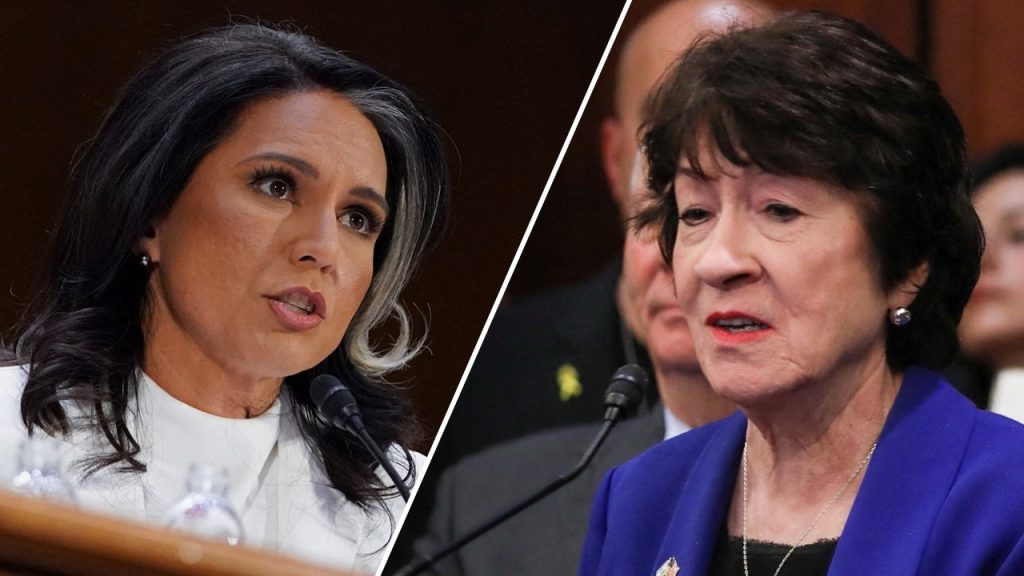Gabbard’s DNI Nomination Gains Crucial Momentum with Collins’ Support
The nomination of Tulsi Gabbard to the position of Director of National Intelligence (DNI) received a significant boost on Monday evening when moderate Republican Senator Susan Collins of Maine announced her intention to support Gabbard’s confirmation. Collins, a key figure on the Senate Select Committee on Intelligence, emphasized the critical role of the DNI in coordinating the Intelligence Community, a position established by legislation she co-authored. She expressed confidence that Gabbard shares her vision of streamlining the DNI’s office, which she believes has grown excessively large. Collins also highlighted Gabbard’s satisfactory responses to her concerns regarding Edward Snowden, a crucial issue given the sensitive nature of the DNI position. This endorsement from a respected, often independent-minded senator significantly bolsters Gabbard’s chances of advancing through the confirmation process.
Collins’ Influence and the Path to Confirmation
Senator Collins’ endorsement carries considerable weight due to her reputation for occasionally diverging from her party line. Her recent vote against Defense Secretary Pete Hegseth’s confirmation demonstrated her willingness to prioritize her own judgment over partisan pressures. This independent streak makes her support for Gabbard all the more impactful, signaling to other senators that Gabbard has the potential to garner bipartisan support. This support is crucial for Gabbard, whose past stances and controversial statements have alienated some members of both parties.
Collins’ support also sets a precedent for other moderate Republicans who may be considering their vote on Gabbard’s nomination. Her endorsement could sway undecided senators and pave the way for a smoother confirmation process. With Collins on board, Gabbard is closer to securing the necessary votes within the committee to advance her nomination to the full Senate. While the path to confirmation is not guaranteed, Collins’ backing provides a significant advantage for Gabbard’s prospects.
The Importance of Garnering Republican Support
The Senate Select Committee on Intelligence is poised for a crucial vote on Gabbard’s nomination. The committee’s composition requires Gabbard to garner significant Republican support to advance her nomination to the Senate floor. Senator Collins joins a small group of Republican committee members who have publicly expressed their support for Gabbard. However, the crucial vote of Senator Todd Young of Indiana remains uncertain. Young’s decision is highly anticipated, and his support is likely essential for Gabbard’s nomination to proceed.
The pressure on Senator Young has intensified due to public scrutiny, including criticism from high-profile figures like Elon Musk. While initial reports suggested Musk was critical of Young’s indecision, subsequent communication between the two seems to have shifted Musk’s perspective, indicating a potential alliance. This development highlights the intense focus on Young’s upcoming vote and the broader significance of Gabbard’s nomination for individuals and groups with diverse interests.
The Full Senate Vote: Challenges and Opportunities
Should Gabbard’s nomination clear the Senate Intelligence Committee hurdle, the next challenge lies in securing confirmation from the full Senate. Based on the current Senate composition, Gabbard can afford to lose only a handful of Republican votes, assuming she receives no support from Democrats. This narrow margin emphasizes the importance of every Republican vote and the potential impact of individual senators’ decisions. The situation further underscores the complexities of the confirmation process and the delicate balance of power in the Senate.
Collins’ past actions, particularly her vote against Hegseth’s confirmation, suggest a potential willingness to consider candidates based on their qualifications and suitability for the position, rather than strict adherence to party lines. This approach could influence other moderate Republicans and potentially even garner some Democratic support for Gabbard. While securing bipartisan support remains a significant challenge, the possibility exists, especially with Collins leading the charge and potentially influencing other senators.
The Significance of Gabbard’s Potential Confirmation
The potential confirmation of Tulsi Gabbard as DNI carries significant implications for the future of the intelligence community. Gabbard’s past stances and controversial statements have generated both strong support and vehement opposition. Her confirmation would signal a shift in the political landscape and could reshape the priorities and direction of the intelligence agencies.
The DNI position requires a leader who can navigate complex national security challenges, manage sensitive information, and maintain the trust of both the intelligence community and the American public. Gabbard’s ability to effectively fulfill these responsibilities would be closely scrutinized, given her controversial past and the polarized political climate. Her confirmation would undoubtedly spark continued debate and scrutiny regarding her qualifications, experience, and ability to lead the intelligence community.

